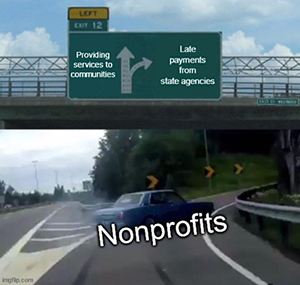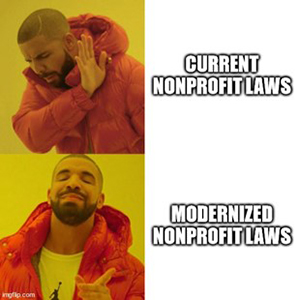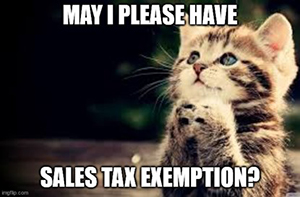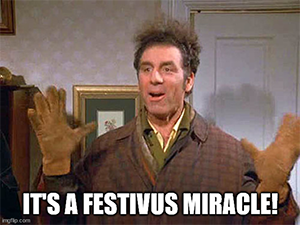Last updated: July 14, 2022
David Heinen, Vice President for Public Policy and Advocacy
When the NC Senate and NC House of Representatives adjourned on Friday, July 1, they (sort of) ended the General Assembly's 2022 short session. The last sentence includes the "sort of" qualifier because the 2021-22 legislative session isn't officially done yet. As part of their adjournment resolution, legislators agreed to come back to Raleigh once a month for the remainder of the year just in case any new crises arise that might require legislative action...or in case legislative leaders decide to take up other policy priorities before the end of the year. But with the main part of the 2021-22 legislative session completed, the Center is offering this summary of legislation that affected the work of charitable nonprofits.
Mo Money, Mo Problems
Unprecedented amounts of (one-time) funding for nonprofits in the state budget
Last November, for the first time in four years, the General Asssembly and Governor Roy Cooper were able to agree on a new state budget for FY2021-22 (S.105). Legislators had more flexibility than usual (and more choices to make) in developing last year's budget since the state had a sizable (multi-billion dollar) tax surplus and about $5.7 billion in one-time state funding from the American Rescue Plan Act (ARPA).

With more money than usual available to spend, legislators invested an unprecedented amount of state funds to support nonprofits. Overall, the budget includes about $745 million in new funding for nonprofits, including $423 million in new investment in nonprofits’ operations and programs and $322 million in support for building projects at nonprofits. Most of this new investment in nonprofits was one-time spending, and much of it was earmarked for specific nonprofits, often those operating in the districts of key legislative leaders. The Center provided a comprehensive analysis of the nonprofit funding and provisions in the FY2021-23 budget. This summer, legislators provided another $232 million in funding to nonprofits' operations and building projects, mostly through additional earmarks as part of their FY2022-23 budget adjustments. The Center once again provide a comprehensive analysis of the nonprofit funding and provisions in this year's budget.
Potential problems in the budget for nonprofits
While the nonprofit sector as a whole fared well with new state funding, a few parts of the state budget could still prove problematic for nonprofit organizations.
Despite the Center's advocacy, legislators didn't create a $75 million nonprofit relief fund that would have enabled any nonprofit that suffered economic harm due to the COVID-19 pandemic to apply for a one-time grant. The Center had asked legislative leaders to use some of the state's ARPA funds for this nonprofit relief fund. Legislators assured the Center that, through their earmarks and economic relief grants, they allocated far more than $75 million of ARPA funds to nonprofits. While earmarks are a boon for the nonprofits that receive them, they are a less equitable way of distributing ARPA funds to nonprofits than a nonprofit relief fund since they don't necessarily prioritize funding for nonprofits with the greatest needs, the most significant economic loss during the pandemic, or those serving low-resource communities.
Better late than never?
Government contracting reform
For years (decades actually), nonprofits that provide public services through state grants and contracts have experienced a variety of challenges with their state contracts, including late payments, underpayment for indirect costs, and overly complex grant/contract applications and reporting requirements.

This summer, the General Assembly pased a new law (H.B. 791) that addresses many of the issues that nonprofits have experienced with their grants and contracts with the NC Department of Health and Human Services (DHHS). Specifically, the new law makes four reforms to DHHS grants and contracts with nonprofits:
- It establishes a de minimis 10% indirect cost rate for nonprofit grants/contracts with DHHS, regardless of whether funding initiates from federal or state funds. Many nonprofits currently have contracts that provide for much lower indirect cost rates or that make no allowance for nonprofits’ indirect costs.
- It requires DHHS to provide most nonprofits with multi-year contracts rather than one-year contracts that are renegotiated every year. This change should reduce much of the red tape and contracting delays that nonprofits experience during the contract renewal process.
- It provides three-month contract extensions for most nonprofits to ensure continuity of services – and of payments to nonprofits – after the end of nonprofits’ multi-year contracts with DHHS. This change is intended to help prevent many of nonprofits’ payment delays that have resulted from understaffing at DHHS.
- It requires legislative staff to provide nonprofit contact information for nonprofits receiving directed grants in the state budget to DHHS in a timely manner. DHHS has identified the lack of clear communication about nonprofit contact information as a cause of some of its contract and payment delays.
This new law is based on input from dozens of nonprofits that have shared their stories about late payments, late contracts, underpayment for indirect costs, and red tape in their grants and contracts with DHHS. The Center worked with Senator Jim Burgin (R-Harnett), DHHS, and a variety of nonprofit partners on this bill.
While this new law should help with some of the challenges that nonprofits have experienced with their grants and contracts with DHHS, it is only a start of the process of nonprofit-government contracting reforms. The Center is continuing to work with our partners in state government on additional nonprofit contracting reforms that will help strengthen partnerships between nonprofits and the many state agencies with which they partner through grants and contracts. We’ll keep you posted as opportunities arise for your nonprofit to be a part of this process.
That law is soooooo 1993!
Modernizing nonprofit laws
Two of the main laws that govern North Carolina nonprofits – the NC Nonprofit Corporation Act and the NC Charitable Solicitation Licensing Act – were adopted in the early 1990s and haven't been changed much over the past three decades. Based on the input of many nonprofits – and of lawyers and tax professionals who represent nonprofit organizations – the Center has identified several modernizing changes that need to be made to these laws. In 2021, the Center worked with legislators to get three bills introduced (technically six bills since there were House and Senate version of each one) to make these modernizing changes.

The need for one modernizing change became evident during the early days of the COVID-19 pandemic when nonprofits couldn't hold board or membership meetings in person. State law at that time required most nonprofits with members to hold their membership meetings in person, and many nonprofits' bylaws didn't allow board members to use email to vote on actions taken outside of meetings by unanimous consent. In 2020, Governor Cooper issued an executive order that temporarily allowed for nonprofits to conduct membership meetings remotely, but clearly a more permanent solution was necessary. At the beginning of the 2021 legislative session, the Center worked with legislators on proposals to make these modernizing changes to create new options for electronic voting by nonprofit boards and remote nonprofit membership meetings. Thanks to the leadership of Senator Amy Galey (R-Alamance) and Representative Destin Hall (R-Caldwell), the General Assembly unanimously passed legislation (H.B. 320) to make these changes, and Governor Cooper signed the bill into law last September.
The Center also recommended that legislators make several other modernizing changes to the Nonprofit Corporation Act, including a simple, no-fee annual report for nonprofits, streamlining of the sometimes cumbersome process for Attorney General review of nonprofit asset transfers, and permission for nonprofit corporations to merge with other types of 501(c)(3) tax-exempt entities. Thanks to the work of Representatives Brandon Lofton (D-Mecklenburg), Tim Moffitt (R-Henderson), Julia Howard (R-Davie), and Robert Reives (D-Chatham), the House considered a bill (H.B. 696) to make these changes. Senators Mike Woodard (D-Durham), Julie Mayfield (D-Buncombe), and Jim Burgin (R-Harnett) introduced identical legislation (S.540) in the Senate. While neither bill became law, a House committee overwhelmingly approved a version of the bill last year, and the Center is working to get similar legislation introduced in 2023.
The same lawmakers who introduced the nonprofit corporation modernization bills also sponsored House (H.B. 695) and Senate (S.681) legislation to reform the state's charitable solicitation act by exempting smaller nonprofits from licensing requirements, aligning the state's automatic filing extensions with the IRS's automatic extension periods for 990 filings, and eliminating an unnecessary notarization requirement. The House unanimously passed the bill last year, and the Center worked with several Senators to get the provisions included in legislation during the 2022 short session. Although the bill ultimately didn't become law, it had broad bipartisan support, and the Center is working on plans to get it enacted in 2023.
Sometimes the best changes are the most obvious ones
Access to healthcare
One major policy priority that legislators weren’t able to accomplish (so far) was expanding Medicaid coverage to adults with incomes up to 133% of the federal poverty level. Medicaid expansion would provide health coverage for about 600,000 North Carolinians whose incomes are too much to qualify for Medicaid currently but not enough to receive health care subsidies in the Affordable Care Act health marketplace.

The Center strongly supports Medicaid expansion for two reasons. First, it would complement the work of many nonprofits that provide services to North Carolinians who don’t currently have adequate health coverage. Second, it would provide health coverage for some employees of nonprofits that don’t offer group health plans and whose salaries leave them in the health care coverage gap.
In previous years, Medicaid expansion had broken down largely along partisan lines, with Democrats supporting it and most Republicans opposing it. This year, it had strong bipartisan support with the House (S.408) and Senate (H.B. 149) both approving Medicaid expansion legislation. The two chambers couldn’t agree on a final version, largely because the Senate wanted to couple Medicaid expansion with other controversial healthcare proposals including changes to the state’s certificate of need laws and a version the SAVE Act, which would enable more nurses to provide services without supervision by a physician. There is a good chance that legislators could come back to Raleigh later this year to approve Medicaid expansion.
Last year, lawmakers passed another law that has already created a new healthcare option for some nonprofits. That policy change (S.228) allows North Carolina nonprofits and small businesses to offer exclusive provider benefit (EPO benefit) plans for their employees. EPO benefit plans are typically 10-15% less expensive than other health insurance plans and allow participants to use a limited network of local health care providers while paying the full cost for any out-of-network health services other than emergency care.
Nothing is certain but death and taxes
Tax policy affecting nonprofits
Based on nonprofits' input, the Center recommended that legislators consider three tax policy solutions to help nonprofits operate more effectively:
- Exempting most 501(c)(3) nonprofits from paying sales and use tax when they purchase goods and services. Under current law, charitable nonprofits pay sales tax and apply for refunds from the NC Department of Revenue. Sales tax exemption would save nonprofits time and money.
- Creating a new state tax credit for charitable contributions by individuals who use the standard deduction. This could help encourage North Carolinians to give more generously to support the work of nonprofits serving communities throughout the state.
- Exempting nonprofits from collecting and remitting sales tax on the ticket price or admission fees from most fundraising events. This clarifying change would help nonprofits use more of the revenue from their fundraising events for programs and services related to their missions.

The good news is that legislators listened to the suggestions from the Center and nonprofits and introduced legislation on nonprofit sales tax exemption (S.441), charitable contributions for non-itemizers (S.504), and exempting most nonprofit fundraising events from sales tax (S.440). The Center is appreciative of Senators Don Davis (D-Greene), Senator Mike Woodard (D-Durham), and Senator Jim Burgin (R-Harnett) for introducing these important bills. Unfortunately, none of the three bills gained traction during the legislative session. The Center will continue to pursue all three of these ideas in 2023.
No nonprofits were harmed in the making of these laws
Legislative ideas that could have caused problems for nonprofits
Over the past two years, legislators introduced several bills that could have been harmful to nonprofits in a variety of ways. The bad news is that the bills containing five of these problematic ideas passed both the House and the Senate. The good news is that none of the potentially problematic language became law. Here are some details about the potential problems...and how nonprofits' advocacy helped prevent them from becoming laws.

Potential problem: Preventing local officials from serving on nonprofit boards
Last year, the Senate worked on legislation designed to increase local government transparency (S.473). The original version of the bill would have prohibited local governing bodies from awarding contracts, grants, or appropriations to nonprofits if any member of the local governing body served on the nonprofits’ board of directors. Many nonprofits had told the Center that this provision could have jeopardized their funding from local governments, so the Center successfully advocated for the Senate to make an amendment (which was unanimously approved) that helped ensure nonprofits with board members who serve on local governing bodies (i.e. county boards of commissioners, city councils, and town councils) can still receive grants, contracts, or appropriations from these local governments. Under the amendment, any elected officials serving on a nonprofit’s board would need to recuse themselves from the decision to provide funding to that organization.
The Senate and House passed the bill with that amended language, and Governor Cooper signed it into law in December. Earlier this year, the Center began to hear that, even with the improved law, many nonprofits in various parts of the state were beginning to have county commissioners and city council members resign from their boards because of concerns about the implications of the law on their ability to vote on local governments' budget. Fortunately, the problem evenutally resolved itself in almost every county or municipality after the Center worked with local government advocates and local leaders to help educate them about the actual requirements of the law and worked with them on procedural workarounds that would allow local elected officials to serve on nonprofit boards and vote on their local government's budget.
Potential problem: Onerous fundraising requirements
Last year, several legislators pursued legislation intended to protect donor privacy. The main provision in the donor privacy bill (S.636) would have kept donor information in Schedule B of the Form 990 confidential, even if state officials had access to it. This requirement was fairly inocuous, since it mirrors the federal tax law requirement that nonprofits redact donor information in Schedule B when they share their 990s. However, another provision of the bill would have prohibited nonprofits from disclosing “the identity of any person donating monies or other tangible goods to the nonprofit corporation” without the donor’s consent. This language would have created significant new fundraising burdens – and potentially legal liability – for many 501(c)(3) nonprofits since it would mean that nonprofits would not be allowed to acknowledge their individual or corporate donors on their websites, in their publications, in annual reports, at fundraising events, or at meetings and conferences without first getting the permission of each donor. Nonprofits that didn’t get donor approval could be subject to civil legal action. The Center worked with the bill’s sponsor and with organizations that had promoted the bill on alternative language that ensured the bill didn’t add burdensome new requirements for nonprofits. The Senate amended the bill using the Center's language. Ultimately, it didn't matter since Governor Cooper vetoed the bill.
Problem: Government overreach into nonprofits' operations
Over the past two years, legislators pushed for three policy changes that would have set bad precedents by limiting the independence of a few nonprofits. Fortunately, legislators fixed one of these bills, and Governor Cooper vetoed the other two.
- One bill (H.B. 91) from 2021 sought to make changes to the governance and operations requirements on the nonprofit organization that administers interscholastic high school athletic activities in North Carolina. Originally, the bill would have required the nonprofit to sign a memorandum of understanding with the state that would have limited the organization’s board governance, contracting, and fundraising ability and does not make the nonprofit a quasi-governmental entity that is subject to state open meeting laws and public records laws.The Center opposes government policies that limit nonprofits’ governance as independent, nongovernmental corporations with control over their own organizational policies and practices, and we expressed concerns that the bill would have created a precedent of the state limiting the ability of a nonprofit organization to operate as an independent organization. Last November, legislators finally agreed to an arrangement that does not compromise nonprofit independence, and Governor Cooper signed this (no longer problematic) bill into law.
- A second 2021 bill (S.725) would have prohibited nonprofits from providing funding to the State Board of Elections or to county election boards. Some legislators had expressed concern that some organizations – including nonpartisan 501(c)(3) nonprofits – could provide funding to local elections boards to bolster support in communities with strong partisan leanings. Governor Cooper ultimately vetoed this bill.
- At the end of the 2022 short session, legislators introduced and quickly passed a bill (S.593) that would have created independent boards for three state schools for individuals with disabilities. One provision in the bill would have enabled the schools to create independent nonprofits to raise private funds to support their operations. Unfortunately, the bill would have required that these nonprofits “shall not engage in partisan political activity or policy advocacy.” The Center explained to legislators that the prohibition on partisan political activity makes sense and is the same limitation that is in place for any 501(c)(3), but that the limitation on “policy advocacy” may have been problematic for nonprofits established to support these school. Because “policy advocacy” is a very broad term, this limitation could have prevented nonprofits formed by these schools from engaging in many forms of legal and legitimate policy advocacy such as education of the public about policy issues and advocating with local governments on matters affecting their organizations’ operations or the people they serve. Ultimately, Governor Cooper vetoed the bill. The Center will continue to work with legislators to educate them that 501(c)(3) nonprofits can – and often should – legally engage in policy advocacy and to ensure that future legislation doesn’t set unreasonable limits on some nonprofits’ advocacy.